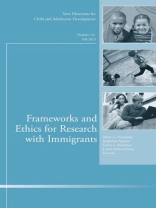Over the last 3 decades, there has been a rapid growth of diverse immigrant-origin populations in the United States and other postindustrial nations. This volume provides guidance in navigating the complexities of conducting research with immigrant-origin children, adolescents, and their families. It considers culturally and contextually embedded methodologies with a focus on ethical considerations in studying immigrant origin populations.
Topics addressed include:
* Culturally and contextually embedded methodological approaches
* Undocumented status vulnerability
* Research logistics to provide protections to youth and their families as well as negotiating institutional review boards
* The role of researchers in shaping research
* Incorporation of a social and cultural lenses in the analysis and interpretation of studies
* Policy implications of presenting findings with this population.
This is the 141st volume in this series. Its mission is to provide scientific and scholarly presentations on cutting edge issues and concepts in child and adolescent development. Each volume focuses on a specific new direction or research topic and is edited by experts on that topic.
Spis treści
1. An Ethical Frame for Research with Immigrant Families 1
Jacqueline Nguyen, María G. Hernández, Carrie L.Saetermoe, Carola Suárez-Orozco
This introductory chapter frames the volume, highlighting thesignificance of using an ethical framework for studying the growingpopulation of immigrant children, adolescents, and theirfamilies.
2. Taking Perspective: Context, Culture, and History 9
Marcelo M. Suárez-Orozco, Carola Suárez-Orozco
This chapter considers the importance of taking a contextual, cultural, and historical perspective in understandingimmigration.
3. Theoretical, Methodological, and Ethical Challenges to the Study of Immigrants: Perils and Possibilities 25
Ramaswami Mahalingam, Verónica Caridad Rabelo
This chapter addresses how a researcher’sidentity–including racial, ethnic, and immigrant background;language background; education; socioeconomic status; andprivilege–affects the research process.
4. Doing No Harm and Getting It Right: Guidelines for Ethical Research with Immigrant Communities 43
María G. Hernández, Jacqueline Nguyen, Saskias Casanova, Carola Suárez-Orozco, Carrie L. Saetermoe
The authors provide pragmatic suggestions on research logisticsand ethics in studying immigrant families.
5. Undocumented Status: Implications for Child Development, Policy, and Ethical Research 61
Carola Suárez-Orozco, Hirokazu Yoshikawa
The authors examine ways in which unauthorized status affectsthe millions of children, adolescents, and emerging adults caughtin its wake. They reflect upon the ethical policy implications andconsider research strategies in conducting ethical research withthis population.
6. Sensitive Subjects: Research Choices and Presentational Challenges in Studying Immigrant Children and Families 79
Randy Capps, Michael Fix
Choices in framing research and representing results withimmigrant children and families are often not thoughtfullyconsidered. The authors highlight decisions they have made in threedifferent studies and the implications for policy.
INDEX 9












